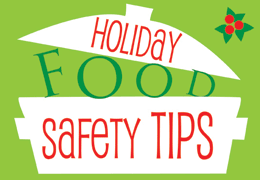Holiday Health & Safety
How to Make Better New Year's Resolutions
It's that time of year - the ball has dropped, the champagne bottles are empty and you have a list of resolutions to start living your best life in 2023. But research and polling show that many people fail to reach their goals. If you routinely give up your resolutions by February, maybe the key to succeeding is rethinking the whole idea of what a resolution is. NPR's Elissa Nadworny talks with Marielle Segarra, host of Life Kit about why focusing less on goals and more on intentions may be a better approach to making resolutions. Listen Here
5 Ways To Avoid Holiday Heart Syndrome
To have fun celebrating without putting your heart under additional stress, follow five simple suggestions:
- Don't binge drink. Limit your alcohol consumption to one drink per day for women, and two drinks per day for men.

- Drink lots of water. Especially if you mess up suggestion #1.
- Limit fatty, sugary foods. You can eat some of the cookies, just not all of them.
- Watch your salt. No more than 2,300 milligrams a day; even less if you have high blood pressure or heart failure.
- Avoid too much caffeine.
Get more tips for watching your nutrition during the holidays.
10 TIPS TO HELP YOU KEEP YOUR NEW YEAR’S RESOLUTION(s)
1. BE REALISTIC
The surest way to fall short of your goal is to make your goal unattainable. For instance, resolving to NEVER eat your favorite food again is setting you up to fail. Instead, strive for a goal that is attainable, such as avoiding it more often than you do now.

The surest way to fall short of your goal is to make your goal unattainable. For instance, resolving to NEVER eat your favorite food again is setting you up to fail. Instead, strive for a goal that is attainable, such as avoiding it more often than you do now.
2. PLAN AHEAD
Don’t make your resolution on New Year’s Eve. If you wait until the last minute, it will be based on your mindset that particular day. Instead, it should be planned well before December 31st arrives.
Don’t make your resolution on New Year’s Eve. If you wait until the last minute, it will be based on your mindset that particular day. Instead, it should be planned well before December 31st arrives.
3. OUTLINE YOUR PLAN
Decide how you will deal with the temptation to skip that exercise class or have that piece of cake. This could include calling on a friend for help, practicing positive thinking and self-talk, or reminding yourself how your “bad behavior” will affect your goal.
Decide how you will deal with the temptation to skip that exercise class or have that piece of cake. This could include calling on a friend for help, practicing positive thinking and self-talk, or reminding yourself how your “bad behavior” will affect your goal.
4. MAKE A “PROS” AND “CONS” LIST
It may help to see a list of items on paper to keep your motivation strong. Develop this list over time, and ask others to contribute to it. Keep your list with you and refer to it when you need help keeping your resolve.
It may help to see a list of items on paper to keep your motivation strong. Develop this list over time, and ask others to contribute to it. Keep your list with you and refer to it when you need help keeping your resolve.
5. TALK ABOUT IT
Don’t keep your resolution a secret. Tell friends and family members who will be there to support your resolve to change yourself for the better or improve your health. The best-case scenario is to find a buddy who shares your New Year’s resolution and motivate each other.
Don’t keep your resolution a secret. Tell friends and family members who will be there to support your resolve to change yourself for the better or improve your health. The best-case scenario is to find a buddy who shares your New Year’s resolution and motivate each other.
6. REWARD YOURSELF
This doesn’t mean that you can eat an entire box of chocolates if your resolution is to eat a better diet. Instead, celebrate your success by treating yourself to something you enjoy that doesn’t contradict your resolution. If you have been sticking to your promise to eat better, for example, reward yourself with new fitness clothing or by going to a movie with a friend.
This doesn’t mean that you can eat an entire box of chocolates if your resolution is to eat a better diet. Instead, celebrate your success by treating yourself to something you enjoy that doesn’t contradict your resolution. If you have been sticking to your promise to eat better, for example, reward yourself with new fitness clothing or by going to a movie with a friend.
7. TRACK YOUR PROGRESS
Keep track of each small success. Short-term goals are easier to keep, and each small accomplishment will help keep you motivated. Instead of focusing on losing 30 pounds, focus on losing the first five. Keep a food journal to help you stay on track, and reward yourself for each five pounds lost.
Keep track of each small success. Short-term goals are easier to keep, and each small accomplishment will help keep you motivated. Instead of focusing on losing 30 pounds, focus on losing the first five. Keep a food journal to help you stay on track, and reward yourself for each five pounds lost.
8. DON’T BEAT YOURSELF UP
Obsessing over the occasional slip won’t help you achieve your goal. Do the best you can each day, and take one day at a time.
Obsessing over the occasional slip won’t help you achieve your goal. Do the best you can each day, and take one day at a time.
9. STICK TO IT
Experts say it takes about 21 days for a new activity to become a habit and six months for it to become part of your personality. It won’t happen overnight, so be persistent and patient!
Experts say it takes about 21 days for a new activity to become a habit and six months for it to become part of your personality. It won’t happen overnight, so be persistent and patient!
10. KEEP TRYING
If you have totally run out of steam when it comes to keeping your resolution by mid-February, don’t despair. Start over again! Recommit yourself for 24 hours. You can do anything for 24 hours. The 24-hour increments will soon build on each other and, before you know it, you will be back on track.
If you have totally run out of steam when it comes to keeping your resolution by mid-February, don’t despair. Start over again! Recommit yourself for 24 hours. You can do anything for 24 hours. The 24-hour increments will soon build on each other and, before you know it, you will be back on track.
Avoiding Holiday Stressors: Tips For A Stress-Free Season
The “most wonderful time of the year” can quickly turn into the most stressful time of the year for many. When compounded by a mental illness, common holiday pressures can create a perfect storm of exacerbated stressors, symptoms and setbacks if not proactively addressed. 
The reality is that potential hazards exist at every turn during the holidays. These situations can trigger heightened difficulties for people suffering from depression, anxiety, PTSD and other mental illnesses. The holidays can also introduce additional stressors such as complicated relationship dynamics at family gatherings, grief over losing a loved one or simply trying to live up to the unattainable expectations of the “perfect holiday.”
While it’s important that all people consider the impact of the holidays on emotional well-being, it is crucial that those with mental illness consider tactics for avoiding pitfalls. Of all the things on your holiday preparation to-do list, the most critical one is maintaining your mental health and practicing self-care.
Major Depressive Disorder With A Seasonal Pattern
Major Depressive Disorder with a Seasonal Pattern (formerly known as seasonal affective disorder, or SAD), is a form of depression that often accompanies changes in seasons. This disorder results from chemical changes in the brain and body and is best controlled with the help of a mental health professional who understands the nuances of treating this condition. Whether through online, remote care options such as telepsychiatry or in-person treatments, seeking professional support is truly beneficial in proactively managing this condition leading up to, during and following the holiday season.
Symptoms of SAD can become more pronounced as the holidays approach. These tips can help you manage your symptoms during the holidays.
- Stay hydrated. Drink plenty of water and herbal teas, and don’t forget to hydrate your skin with lotions and lip balms. Hydration nourishes the brain and its physical effects can improve your overall mood.
- Find time to exercise. The holiday season is a great time to ice skate, ski or hike. If you don’t have access to these outdoor activities, any form of exercise will release endorphins, which can lessen the symptoms of depression.
- Spend time with loved ones. This offers an opportunity for social interaction, which can help lessen the feelings of loneliness that may come around this time of year.
- Pamper yourself. Taking a bath, having a warm drink or getting a massage can create a sense of calm and happiness, especially during the stress of the holidays.
- Indulge without overconsuming. Treating yourself can make you happy, but over-indulging in unhealthy food around the holidays can negatively impact symptoms.
Grief Over The Holidays
One of the greatest holiday stresses is the absence of a loved one who passed  away. The empty seat where they would have sat can fill families with a sense of grief, loss and emptiness, as well as worsen symptoms for individuals with mental illness. The following recommendations can help you and your family cope:
away. The empty seat where they would have sat can fill families with a sense of grief, loss and emptiness, as well as worsen symptoms for individuals with mental illness. The following recommendations can help you and your family cope:
- It’s not all sad. Know that some parts of the holiday will be wonderful, and some parts will be sad. The anticipation of sadness may be stressful, but the holidays provide an opportunity for healing. You can still take joy in the relatives that are present and remember fond memories of holidays past.
- It is okay to feel the way you feel. It is healthy to acknowledge your feelings and work through them, rather than suppressing them.
- Take care of yourself. Find healthy ways to cope, such as exercising. Organizing family walks is a great way to get fresh air and enjoy the company of others. Don’t search for solace in unhealthy foods or alcohol. If alcohol is present, drink responsibly.
- Don’t feel pressured to uphold family traditions. While they might be a comforting way to remember a loved one, sometimes family traditions are too painful to bear. Your family will find new ways to celebrate, and your traditions will adjust with time.
Keep in mind that the loved ones you lost would want you to remember them fondly, to enjoy the holiday season, and to find comfort in having the family come together.
Managing Holiday Expectations
The holiday season only comes once a year, and while it’s understandable to aspire for perfection, it’s important to set realistic, attainable goals. The following are a few key tips for avoiding the stress of perfection.
- Make a budget. While the average American household spent nearly $1,000 on holiday gifts in 2017, it’s important not to go overboard. Do your best to stick to a budget while still leaving a small amount extra for wiggle room; the holidays tend to bring out the generosity in us.
- Come up with a plan. Spread out your errands, so you don’t become overwhelmed with too many tasks at once, and don’t forget to schedule some relaxation time!
- Find the best time to shop. Malls are less crowded on weekdays and weeknights. If you can manage, try to go during the day and park farther away from the stores. Your time in the sunlight walking to or from your car can boost your serotonin levels. Practicing mindful activities while you wait in line can also help you stay calm among the holiday shopping chaos.
- Be kind to yourself. All you can do is your best and your best is good enough. It’s impossible to please everyone, but we are often our own harshest critics.
Keep in mind that the holidays are about spending time with loved ones, not gifts. Your friends and family will be happy to create memories with you, so don’t worry about finding an expensive gift or if they will like it; they will appreciate your efforts and affection regardless of what you give them. The holidays bring joy and happiness as well as frustration and stress. This holiday season, you may have many things to take care of, but the most important one is yourself.
Brighten the holidays by making your health and safety a priority. Take steps to keep you and your loved ones safe and healthy—and ready to enjoy the holidays
- Wash hands often to help prevent the spread of germs. It’s flu season.
Wash your hands with soap and clean running water for at least 20 seconds.
- Bundle up to stay dry and warm. Wear appropriate outdoor clothing: light, warm layers, gloves, hats, scarves, and waterproof boots.
- Manage stress. Give yourself a break if you feel stressed out, overwhelmed, and out of control. Some of the best ways to manage stress are to find support, connect socially, and get plenty of sleep.
- Don’t drink and drive or let others drink and drive. Whenever anyone drives drunk, they put everyone on the road in danger. Choose not to drink and drive and help others do the same.
- Be smoke-free. Avoid smoking and secondhand smoke. Smokers have greater health risks because of their tobacco use, but nonsmokers also are at risk when exposed to tobacco smoke.
- Fasten seat belts while driving or riding in a motor vehicle. Always buckle your children in the car using a child safety seat, booster seat, or seat belt according to their height, weight, and age. Buckle up every time, no matter how short the trip and encourage passengers to do the same.
- Get exams and screenings. Ask your health care provider what exams you need and when to get them. Update your personal and family history.
- Get your vaccinations. Vaccinations help prevent diseases and save lives. Everyone 6 months and older should get a flu vaccine each year.
- Monitor children. Keep potentially dangerous toys, food, drinks, household items, and other objects out of children’s reach. Protect them from drowning, burns, falls, and other potential accidents.
- Practice fire safety. Most residential fires occur during the winter months, so don’t leave fireplaces, space heaters, food cooking on stoves, or candles unattended. Have an emergency plan and practice it regularly.
- Prepare food safely. Remember these simple steps: Wash hands and surfaces often, avoid cross-contamination, cook foods to proper temperatures and refrigerate foods promptly.
- Eat healthy, stay active. Eat fruits and vegetables which pack nutrients and help lower the risk for certain diseases. Limit your portion sizes and foods high in fat, salt, and sugar. Also, be active for at least 2½ hours a week and help kids and teens be active for at least 1 hour a day.
Enter Title
Enter Title
55 Things to Do at Home in the Summer (That Don’t Require Any Outdoor Space)
So whether you’re a true homebody or you’re just looking for some ways to save a little cash this season, here is a list of 55 things you can do from the comfort of inside your own home. The best part? Not a single one of them requires a special outdoor space, patio, or backyard. Some of them might call for a little imagination or getting outside your comfort zone, but all of them are a fun, interesting, and different way to pass the time this summer.
Credit: Kristin Prough
1. Start an Indoor Herb Garden
Sick of seeing your friends with outdoor space growing all kinds of plants and herbs? Well, if you have a window, you can do that inside. And even if you don’t have good light, there are at-home garden solutions for that, too.
2. Find a New Workout Routine
If you’re used to a gym, the idea of working out at home can seem miserable. But instead of putting yourself on an at-home workout schedule you hate, make it a goal to try a new, different DIY workout each week. YouTube is great for this.
If you’re used to a gym, the idea of working out at home can seem miserable. But instead of putting yourself on an at-home workout schedule you hate, make it a goal to try a new, different DIY workout each week. YouTube is great for this.
3. Make a TBR Pile and Commit to It
If you have an untouched bookshelf, go through it and select a stack of books. This will be your TBR (“to be read”) pile for the rest of the summer. Go through the books one by one and donate the ones you know you won’t read again.
If you have an untouched bookshelf, go through it and select a stack of books. This will be your TBR (“to be read”) pile for the rest of the summer. Go through the books one by one and donate the ones you know you won’t read again.
4.Start a Book Club
… and if you want to make it even more fun, then start or join an in-person or virtual book club (sites like Book Clubz can help!). Gather friends at your home or on a video call every few weeks and talk about books, life, or anything in between. It’ll inspire you to read and get you to socialize creatively.
… and if you want to make it even more fun, then start or join an in-person or virtual book club (sites like Book Clubz can help!). Gather friends at your home or on a video call every few weeks and talk about books, life, or anything in between. It’ll inspire you to read and get you to socialize creatively.
5. Have A DIY Cooking Competition
If you live with a partner, challenge them to an at-home cooking competition. Choose an ingredient or a specific type of ingredient and compare recipes at the end of the evening. The prize can be anything you want!
If you live with a partner, challenge them to an at-home cooking competition. Choose an ingredient or a specific type of ingredient and compare recipes at the end of the evening. The prize can be anything you want!
Post Image
Credit: humanmade/Getty Images
6. Perfect Your Favorite Healthy Recipe
You know that thing you love to eat, but have never attempted to make yourself? Maybe it’s fluffy, perfect pancakes or a specific type of dumplings. Maybe it’s a cocktail. Whatever it is, challenge yourself to perfect making it yourself — no matter how many tries it takes.
Credit: humanmade/Getty Images
6. Perfect Your Favorite Healthy Recipe
You know that thing you love to eat, but have never attempted to make yourself? Maybe it’s fluffy, perfect pancakes or a specific type of dumplings. Maybe it’s a cocktail. Whatever it is, challenge yourself to perfect making it yourself — no matter how many tries it takes.
7. … Or Work Through An Entire Cookbook
This is one that’s admittedly inspired by the movie Julie & Julia. Choose a favorite cookbook and commit to making every single recipe in it by the end of the summer. You can even watch the movie first if you want some inspiration for this project.
This is one that’s admittedly inspired by the movie Julie & Julia. Choose a favorite cookbook and commit to making every single recipe in it by the end of the summer. You can even watch the movie first if you want some inspiration for this project.
8. Start a Journal
Creating a journaling routine can be a great way to add structure to the long, hot days of summer. Start your day with an iced coffee and a fresh page, and you’ll probably be feeling inspired in no time.
Creating a journaling routine can be a great way to add structure to the long, hot days of summer. Start your day with an iced coffee and a fresh page, and you’ll probably be feeling inspired in no time.
9. Develop One New Healthy Daily Routine
Think about your daily routine. What does it look like? Is there one part of it that frustrates you or makes you feel anxious/nervous? Well, now’s the time to change it. Identify the most unpleasant part of your daily routine and make it better. Try changing your annoying alarm clock out for something more pleasant, or investing in a new workout tool that will improve your exercise routine. Whatever it is, change it up!
Think about your daily routine. What does it look like? Is there one part of it that frustrates you or makes you feel anxious/nervous? Well, now’s the time to change it. Identify the most unpleasant part of your daily routine and make it better. Try changing your annoying alarm clock out for something more pleasant, or investing in a new workout tool that will improve your exercise routine. Whatever it is, change it up!
10. Makeover An Entire Room For $0
You know that room you really hate? Maybe it’s an office or a guest room or your basement. Challenge yourself to make it into something better with no money at all. Move around furniture or find some “for free” items on Facebook Marketplace to decorate the space. Spending just a few hours of concentrated effort on a room (instead of avoiding it) can make all the difference.
You know that room you really hate? Maybe it’s an office or a guest room or your basement. Challenge yourself to make it into something better with no money at all. Move around furniture or find some “for free” items on Facebook Marketplace to decorate the space. Spending just a few hours of concentrated effort on a room (instead of avoiding it) can make all the difference.
See 45 more ideas HERE


